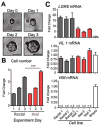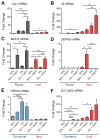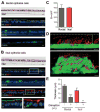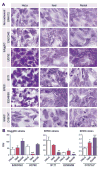Development of an enhanced human gastrointestinal epithelial culture system to facilitate patient-based assays
- PMID: 25007816
- PMCID: PMC4305344
- DOI: 10.1136/gutjnl-2013-306651
Development of an enhanced human gastrointestinal epithelial culture system to facilitate patient-based assays
Abstract
Objective: The technology for the growth of human intestinal epithelial cells is rapidly progressing. An exciting possibility is that this system could serve as a platform for individualised medicine and research. However, to achieve this goal, human epithelial culture must be enhanced so that biopsies from individuals can be used to reproducibly generate cell lines in a short time frame so that multiple, functional assays can be performed (ie, barrier function and host-microbial interactions).
Design: We created a large panel of human gastrointestinal epithelial cell lines (n=65) from patient biopsies taken during routine upper and lower endoscopy procedures. Proliferative stem/progenitor cells were rapidly expanded using a high concentration of conditioned media containing the factors critical for growth (Wnt3a, R-spondin and Noggin). A combination of lower conditioned media concentration and Notch inhibition was used to differentiate these cells for additional assays.
Results: We obtained epithelial lines from all accessible tissue sites within 2 weeks of culture. The intestinal cell lines were enriched for stem cell markers and rapidly grew as spheroids that required passage at 1:3-1:4 every 3 days. Under differentiation conditions, intestinal epithelial spheroids showed region-specific development of mature epithelial lineages. These cells formed functional, polarised monolayers covered by a secreted mucus layer when grown on Transwell membranes. Using two-dimensional culture, these cells also demonstrated novel adherence phenotypes with various strains of pathogenic Escherichia coli.
Conclusions: This culture system will facilitate the study of interindividual, functional studies of human intestinal epithelial cells, including host-microbial interactions.
Keywords: CELL BIOLOGY; DIFFERENTIATION; E. COLI; EPITHELIAL CELLS; INTESTINAL EPITHELIUM.
Published by the BMJ Publishing Group Limited. For permission to use (where not already granted under a licence) please go to http://group.bmj.com/group/rights-licensing/permissions.
Conflict of interest statement
None.
Figures






Comment in
-
Intestinal epithelial spheroids: new tools for studying gastrointestinal diseases.Gut. 2015 Jun;64(6):859-60. doi: 10.1136/gutjnl-2014-307809. Epub 2014 Sep 2. Gut. 2015. PMID: 25183204 No abstract available.
References
-
- Maloy KJ, Powrie F. Intestinal homeostasis and its breakdown in inflammatory bowel disease. Nature. 2011;474:298–306. - PubMed
-
- Cao L, Kuratnik A, Xu W, Gibson JD, Kolling Ft, Falcone ER, et al. Development of intestinal organoids as tissue surrogates: Cell composition and the Epigenetic control of differentiation. Mol Carcinog. 2013 - PubMed
-
- Jung P, Sato T, Merlos-Suarez A, Barriga FM, Iglesias M, Rossell D, et al. Isolation and in vitro expansion of human colonic stem cells. Nat Med. 2011;17:1225–7. - PubMed
Publication types
MeSH terms
Substances
Grants and funding
- DK90251/DK/NIDDK NIH HHS/United States
- P30DK052574/DK/NIDDK NIH HHS/United States
- R01 DK071619/DK/NIDDK NIH HHS/United States
- AI095550/AI/NIAID NIH HHS/United States
- DK100737/DK/NIDDK NIH HHS/United States
- T32 AI007163/AI/NIAID NIH HHS/United States
- DK089016/DK/NIDDK NIH HHS/United States
- DK102557/DK/NIDDK NIH HHS/United States
- R03 DK100737/DK/NIDDK NIH HHS/United States
- P30 DK052574/DK/NIDDK NIH HHS/United States
- DK071619/DK/NIDDK NIH HHS/United States
- U01 AI095550/AI/NIAID NIH HHS/United States
- K08 DK089016/DK/NIDDK NIH HHS/United States
LinkOut - more resources
Full Text Sources
Other Literature Sources
